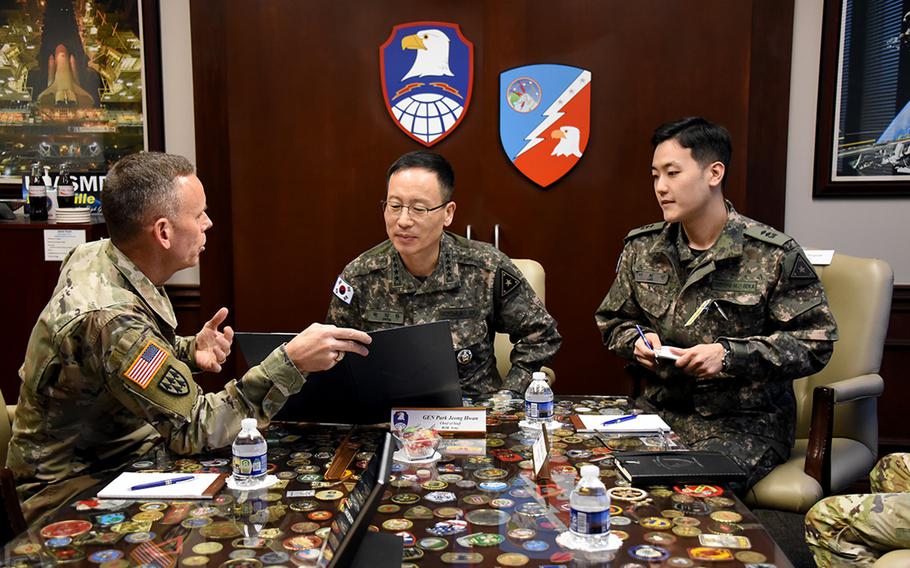
Gen. Park Jeong-hwan, center, chief of staff of the South Korea army, meets with the commander of the U.S. Army Space and Missile Defense Command, Lt. Gen. Daniel Karbler, left, at Redstone Arsenal, Ala., Jan. 24, 2023. (Carrie David Campbell/U.S. Army)
CAMP HUMPHREYS, South Korea — The top army generals from the United States and South Korea pledged on Thursday to strengthen their military alliance and deepen their collaboration in technological ventures.
The U.S. Army’s chief of staff, Gen. James McConville, and his South Korean counterpart, Gen. Park Jeong-hwan, met in Washington, D.C., to sign a Korea-U.S. Strategic Vision Statement that broadly reinforced their “global comprehensive strategic alliance,” according to a Friday report from National Defense Daily, the South Korean military’s news agency.
McConville likened the pledge to “a new starting point” for the two armies and said he looked forward to increasing joint projects in the future, according to the report.
Park’s meeting with McConville was part of a roughly weeklong trip to the United States to meet with Army leaders. On Tuesday, he visited Redstone Arsenal in Alabama, where he met with U.S. Army Space and Missile Defense Command.
Park said he wanted to “draw a blue print” for the South Korean military’s space assets based on its experience working with the command, according to an Army news release Tuesday.
“In a rapidly changing environment, such as the development of advanced science and technology, the reduction of troops, and the implementation of combat through minimal sacrifice, our army’s power and innovation in troop … structure are required to effectively respond to new areas, such as threats from North Korea, space and cyber,” he said, according to the release.
The meetings come less than a week before U.S. Defense Secretary Lloyd Austin is scheduled to visit South Korea, where he will “highlight our commitment to the region,” Pentagon spokeswoman Sabrina Singh told reporters during a Thursday news briefing.
Seoul and Washington have recently conducted several large-scale military drills, including November’s Vigilant Storm aerial exercise that included about 240 aircraft from both countries.
The joint exercises were conducted as North Korea fired roughly 75 missiles in 36 separate days of testing last year, a record. The communist regime last fired a short-range ballistic missile on Jan. 1 and is believed by U.S. and South Korean military officials to have prepared to conduct a nuclear test.